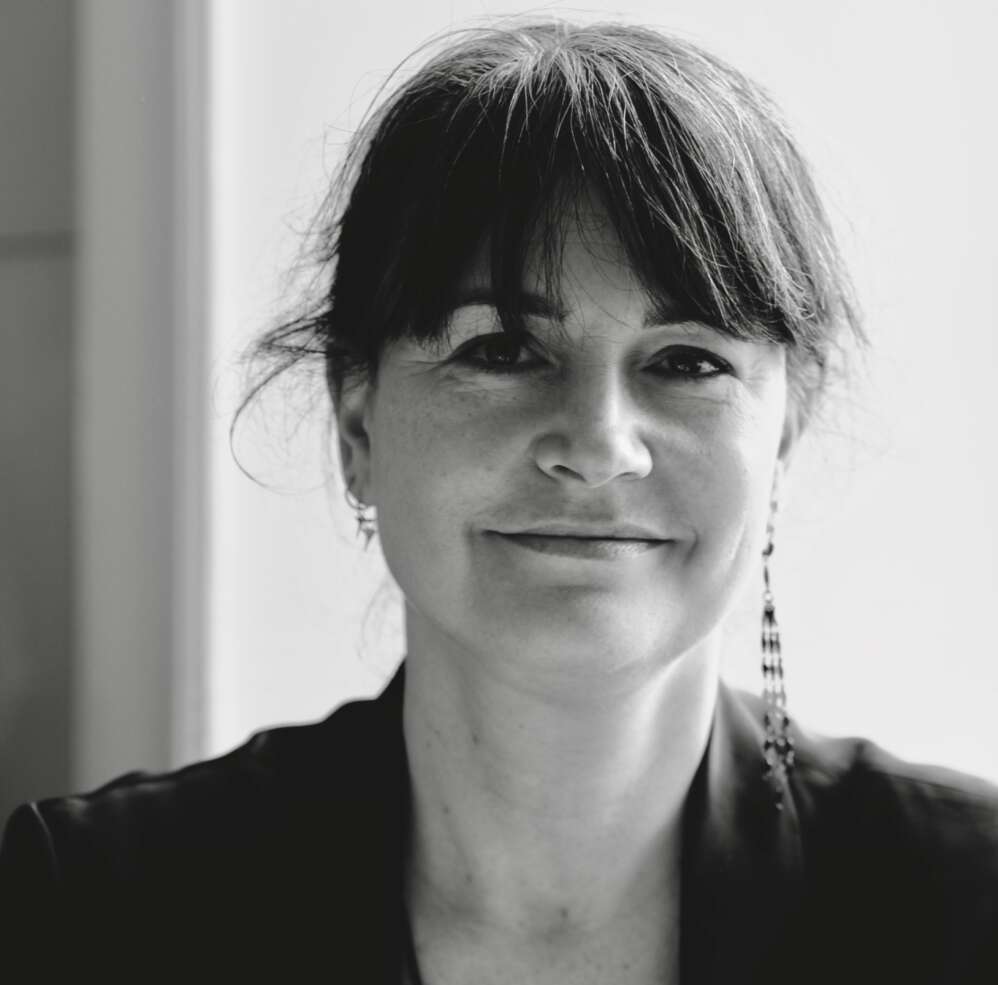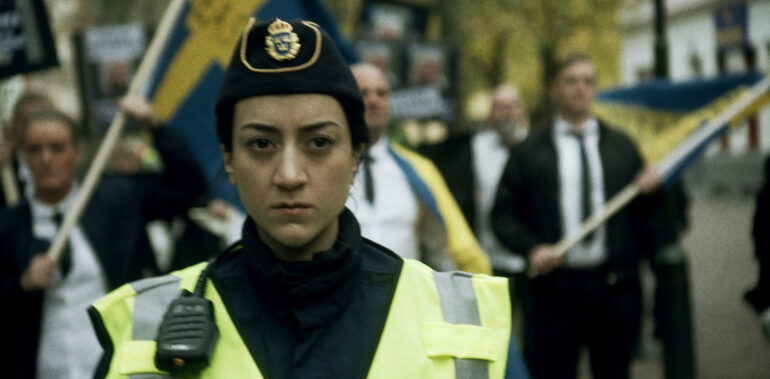WRITTEN BY: Annika Pham
Cilla Jackert is creator/head-writer of SVT’s realistic cop drama Thin Blue Line which premieres Sunday January 17 on SVT’s primetime slot and SVT Play.

Cilla Jackert is creator/head-writer of SVT’s realistic cop drama Thin Blue Line which premieres Sunday January 17 on SVT’s primetime slot and SVT Play.
Cilla Jackert is among five screenwriters nominated for the Nordisk Film & TV Fond Prize-Best Nordic Screenplay, to be handed out on February 3rd during Göteborg’s TV Drama Vision online awards ceremony.
Jackert (b 1968) is an established Swedish screenwriter since 1995. Her first TV project was TV4’s soap opera Tre kronor. She then worked on the Norwegian shows De syv søstre and Hotel Cæsar.
Her big breakthrough was as head-writer/co-writer of the Swedish youth series S.P.U.N.G. She went on head-writing the series Lite som du, Svaleskär, co-wrote SVT’s Molanders and most recently the family saga The Restaurant.
She also wrote the screenplay for Måns Mårlind and Björn Stein’s feature film Shed no Tears (Gudbagge nominated for Best Screenplay in 2014). Jackert is also an established author for children’s books.
Jackert co-wrote the ten-part drama Thin Blue Line (Tunna blå linjen), with Erik Ahrnbom and Malin Marmgren. Sanna Lenken (My Skinny Sister) serves as concept director, with Anders Hazelius (Hashtag) and Micke Hansson (Klassen SVT) acting as episodic directors.
The character-driven series follows the gritty and unglamorous work of the Swedish Malmö police. Dealing with death, social misery and the growth of criminal activity in the city’s notorious problem areas, they keep their spirits up thanks to the strong bonds of the police force.
The story centres around the lives of six police officers - Sara, Magnus, Jesse, Leah, Dani and Faye as they struggle to keep their human values intact in the multi-cultural city of Malmö.
In the title roles are Amanda Jansson (The Restaurant), Oscar Töringe (Top Dog), Gizem Erdogan (Caliphate), Per Lasson (Eagles), Sandra Stojiljkovic (Top Dog) and Anna Sise (Agent Hamilton).
The series was produced by Martin Persson and Erik Magnusson for Anagram Sweden, with support among others from Nordisk Film & TV Fond.
ITV Studios handles global sales.
What does it mean for you to be nominated for the Nordisk Film & TV Fond Prize?
Cilla Jackert: It means a lot! For me personally but also because it’s an award for screenwriters and head-writers. I always fight to make screenwriters more visible.
When did you get into screenwriting and why?
CJ: In 1995 I wrote a short text for a magazine in Sweden and Peter Falck and Christian Wikander – at the time the two head writers for all the big soap operas in Sweden - read the text, liked it and asked if I wanted to work as a trainee editor for Tre Kronor, a weekly soap opera on TV4. I didn’t know anything about screenwriting, and not much about writing. But I thought: if they are willing to take a chance, so am I. I can always quit…I didn’t.
What type of stories are you drawn to?
CJ: I like the small stories in life. Stories that define people. I am fascinated by people’s day-to-day struggle. The choices we make and why. I'm not that interested in hard plot and crime series with constructed suspense.
What was the starting point for the series?
CJ: It takes some time before you can put worlds to an idea. I realised that I actually carried an idea for Thin Blue Line when I found a Swedish twitter account called YB Södermalm (written by two police officers). The show is actually not about six police officers in Malmö. It’s a TV drama about dealing with a reality that can be very scary. Our time, our world and the challenges we face.
How did you split the writing duties with Erik Ahrnbom and Malin Malmgren? In what way did they complement your own writing?
CJ: Erik and I shared a small writing room. We have worked together before. I like and trust him. He is like me. Dark and goofy at the same time, and we ‘know’ when something we say works and when it’s not working. Erik has a degree in screenwriting from Dramatiska Institutet so he has a lot of dramatic keys. I don’t. He helped me all the way with the storyline. Discussed characters, stories, plot-points etc. Although when I start writing the storyline, I also need to be free to make things up while I write. Malin came in later, but she really put her soul into the episodes she wrote. She did a lot of research that we could use. I’m really, really thankful for that.
How would you describe in few words the premise for the series? The human beings behind the cop uniform, and the emotional/ethical dilemma that police officers encounter on a daily basis?
CJ: How can we maintain faith in humanity when the world looks the way it does? Our four main characters have different ways of answering that question.
How long was the research, who did you have access to during that phase and how did you use that information to create your main characters and plot?
CJ: I can’t stop researching. Police-related events happen every day and behind each incident are people who feel things and act based on what they feel. There are also a lot of podcasts about police work, reality shows about police work. There are police officers on Twitter, Facebook and Instagram. I also worked closely with a police officer who is used to working as an actor. He helped me a lot-with stories, but mostly to make the dialogue right. Police officers have a language of their own, legal jargon, but also specials words and idioms.
How did you structure each episode and what are the main storylines over the series’ arc?
CJ: I tried to work as freely and organically as possible, to tell the natural story, not the best plotted story. I work more with a feeling or a theme and a lot of perspective on that theme.
There are three main storylines in the series: the love story between Sara and Magnus, society's attempts to deal with problems in a socio-economically vulnerable area, and thirdly, the attempt to catch a local rapist.
What were your inspirations for the show? Hill Street Blues?
CJ: In a way I was more inspired by ER. A character-driven drama in an arena where a lot is about life and death. But my main inspiration was again the twitter from the Swedish police officers YB Södermalm. They wrote a lot about the police’s day-to-day work. Small things like coming to work and saying “I think I’ll have tea today” and all the other officers looking like “TEA? ARE YOU OUT OF YOUR MIND” so you have a cup of coffee anyway, or as we say in Swedish: ‘snutfika’. But also a lot about the work they do every day that doesn’t make the headlines. It fascinated me.
How was your collaboration with concept creator Sanna Lenken and what major decisions did you take together regarding the tone, rhythm and visual style? What I found very attractive was precisely the pauses, closeup of the main characters at home, joyful family moments for the main characters, after a long stressful day at work...
CJ: I am eternally grateful that Sanna liked the idea and had the patience to wait for a greenlight from SVT. I knew she was the right director for the series. She has the right eye and I felt we had the same goals with the project. Making something that felt authentic and real.
When you work as head-writer you have to find the right people for the project and then trust and respect them in their creative process. I think it's the way to make the result larger than just adding the parts together. Sanna and I worked closely, but I trusted her because I knew she would take the best decisions. She showed me her thoughts about visual style and approved them. Sometimes it is as easy as that. A lot of scenes at home are in the scripts, but Sanna said she wanted more pauses so she filmed a lot of small pauses that we could use, like Leah smoking on her balcony.
As a Swedish screenwriter, I have always envied the Danish screenwriters. They have more control over the shows they created. So I said to Anagram that I want to take an active part in all the decisions where I felt I could contribute, such as the casting or hiring directors. Most importantly, I wanted to play an active role in the editing process. Sanna and I could continue our discussion after they filmed everything. Editing is as important as the scripts, and I will hopefully never work in another way. I could really carry my vision from beginning to end. But I would never have been able to do it without Sanna by my side.
Ultimately, what do you hope viewers will take away from watching the series?
CJ: New perspectives and more understanding for other people.
What’s next for you?
CJ: I am writing a book, scripts for a film and a TV show. Hopefully at least one of them will meet an audience!
In what way has the pandemic impacted your life and work?
CJ: I work alone a lot, so in that sense my work life has not changed so much. But I think it’s hard to have writing rooms over zoom. It’s not the same as being in the same room. I think a lot about what’s possible to film under restrictions. Can we have big scenes with many extras? But writing a screenplay is always about restrictions, making it work within budget and time and daylight etc, so in that way it is not that different.
I think the hardest for me is the sadness. No one close to me has died or even had Covid, but this is such a sad and boring time. It’s been hard to concentrate on writing something that feels more important than the reality we live in right now.
Can you cite the top three TV shows (Nordic or non-Nordic) that you’ve watched recently?
CJ: I don’t watch as much as I should but I really enjoyed The Crown season 4 (although I think the two first seasons are the best), I May Destroy You and Love & Anarchy.
